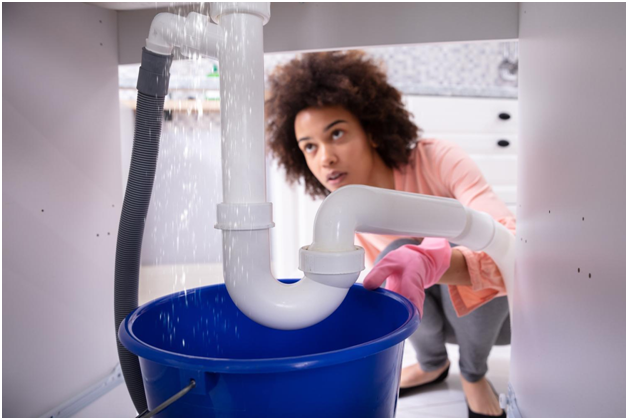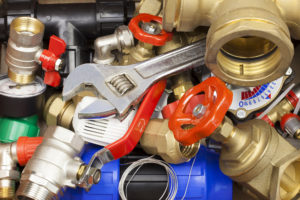Just about every person will have his or her own way of thinking about What to Do During a Plumbing Emergency.

Plumbing emergency situations can strike at any moment, creating tension and potential damages to your home. Whether it's a burst pipeline, a stopped up drain, or a dripping faucet, knowing exactly how to take care of the situation till an expert plumber shows up can save you from more problems. This post offers crucial emergency pipes ideas to help you minimize damage and reclaim control during a pipes crisis.
Switch off the Supply Of Water
The very first step in any pipes emergency is to turn off the water supply. For localized concerns, such as a leaking tap or toilet, shut off the shutoff near the fixture. When it comes to a significant leak or burst pipeline, locate your home's primary water shut-off shutoff and turn it off promptly. Knowing the place of these shutoffs beforehand can conserve valuable time during an emergency situation.
Shut Off Your Water Heater
In particular emergencies, such as a burst pipe, it's important to shut off your hot water heater. This prevents overheating or damages to the device when water quits flowing. Turn off the power supply to the water heater (electrical or gas) and allow it cool down to stay clear of prospective hazards.
Briefly Stop a Burst Pipeline
A ruptured pipeline can lead to significant water damage in mins. To alleviate the concern:
- Clamp or Cover the Pipe: Utilize a pipeline clamp, rubber, or air duct tape as a short-lived seal.
- Divert Water Flow: Preferably, draw away the water into a container or container to limit damage to bordering areas.
- Maintain the Location Dry: Usage towels or a wet/dry vacuum cleaner to remove standing water.
- Call a professional plumbing promptly to resolve the trouble permanently.
Have an Emergency Plumbing Kit
Prepare a fundamental plumbing emergency situation package to manage minor issues efficiently. Your kit should include: - Adjustable wrench
- Plumbing's tape
- Pipe clamps
- Towels and rags
- A plunger
- Epoxy putty
- Bucket.
- Having these devices handy can make a substantial distinction in your capability to handle emergency situations.
Unclog Drains Safely.
A blocked drain can be an aggravating and messy concern. Below's exactly how to tackle it:. - Utilize a Plunger: For sinks or bathrooms, a plunger can often remove minor obstructions. Ensure you make use of the correct type of bettor for the fixture.
- Hot Water and Dish Soap: For grease-related obstructions, put a blend of hot water and dish soap down the drain to separate the oil.
- Avoid Chemical Drainpipe Cleansers: While appealing, chemical cleansers can create even more damage than great, particularly to older pipes.
- If these techniques don't work, avoid using too much force, as it may get worse the obstruction.
Handle Overflowing Toilets.
An overflowing commode can trigger immediate disorder. Right here's what you should do:. - Quit the Water Flow: Remove the container cover and press down on the flapper shutoff to stop water from getting in the dish. Turn off the water to the bathroom if necessary.
- Plunge Delicately: Use a bathroom plunger to remove the clog, however stay clear of aggressive plunging, which can create spilling or additional damage.
- Have the Spill: Use towels or a wipe to clean up water rapidly to stop flooring damages.
Address Tiny Leaks with Short-lived Fixes.
Small leakages can promptly become considerable troubles if left unchecked. Utilize these short-lived fixes up until specialist help shows up:.
- Pipe Tape or Epoxy Putty: Use waterproof tape or epoxy putty to temporarily secure the leakage.
- Rubber and Clamp Method: Wrap an item of rubber or an old internal tube around the leak and secure it with a pipe clamp or duct tape.
- Containers or Towels: Place containers under the leakage to contain water and stop damages to flooring or furniture.
- While these solutions aren't permanent, they can assist minimize water loss and damage.
Take Care Of Frozen Pipes Very Carefully.
In cooler climates, frozen pipelines are a common emergency. If you think an icy pipe:. - Turn Off the Water: Shut down the main water supply to avoid a ruptured pipe.
- Defrost Slowly: Utilize a hairdryer, hot pad, or warm towels to thaw the pipe progressively. Avoid open flames or severe heat, as these can damage the pipeline.
- Inspect for Leakages: Once the pipeline is thawed, look for splits or leaks prior to transforming the water back on.
Know When to Call a Professional.
While quick fixes can aid momentarily, certain pipes concerns require instant specialist attention. Call a plumbing if:.
- A burst pipeline creates extensive flooding.
- Drains or toilets stay clogged up despite your efforts.
- You observe relentless leakages or water stress concerns.
- Your water heater is leaking or malfunctioning.
- Immediately speaking to a specialist ensures the issue is solved appropriately and protects against further difficulties.
Prevent Further Damage.
Taking quick action to lessen damages can conserve you money and time in the future. Below's just how:. - Relocate Valuables: Eliminate furniture, electronics, and other things from the damaged location.
- Usage Sandbags: For flooding situations, place sandbags around the area to reroute water.
- Shut down Electrical power: If water has gotten to electric outlets or home appliances, shut off the electrical power to prevent shocks or fires.
Conclusion.
Pipes emergency situations can be overwhelming, but with the appropriate expertise and devices, you can manage the scenario efficiently till assistance arrives. By switching off the supply of water, resolving little leakages, and utilizing momentary solutions, you can reduce damages and keep your home safe. Bear in mind, these suggestions are momentary solutions; constantly get in touch with a certified plumbing professional to take care of the source of the issue. Prep work and fast reasoning are your best allies in any type of plumbing emergency.
8 Helpful Tips for Managing Plumbing Emergencies at Home
If your plumbing system hasn’t failed once, wait for it because almost everyone has a story to tell. Sometimes, it could be simple emergencies such as a leaking pipe, a blocked cistern, or even a big burst pipe. In situations like this, you need to have some handy tips to save you some money and from possible damages.
Take care of minor issues early.
Sometimes, you could have avoided an emergency by taking proactive measures while it was still early. Some major plumbing emergencies can be a result of an ignored minor issue. We recommend that you have items like plumbing tapes and other related items. A plumbing tape can allow you to manage minor leaks before the plumber arrives.
Cut off the water supply.
This tip is essential in almost any type of leakage problem. For problems like minor leakages in the toilet or kitchen, turn off the supply that takes water to the affected pipes. If the leakage is a major pipe, you must shut off the supply valve to the entire building. This will help you avoid flooding your home and neighbors if you share a flat.
Know your plumbing system
Folks typically move into a new apartment without understanding the water supply around the building. This can prove disastrous if a water emergency arises and the plumber is far away. The previous tip will prove useless if you don’t practice this one. More importantly, know where your water shut-off valve is located – you’ll need that knowledge to prevent potential home floods.
Have some common handy tools
There are lots of plumbing emergencies that you can handle without hiring a plumber. That’s why you must keep some tools available always. Some tools that you can use to fix simple plumbing emergencies easily include plumbing tapes, screwdrivers, thread seal tapes, plungers, pliers, tape measures, and rubber gloves.
Insulate your pipes from cold
You’ll save yourself from many plumbing expenses if you protect your water pipes from the cold. This is because of the harmful effects that cold weather can have on your pipes. During winter, your pipes can burst from being overly expected to freezing temperatures. So, make sure insulators are there to keep the pipes working correctly.
Avoid practices that will clog your toilet.
Many people indulge in practices that can damage the plumbing system of the entire building. One of these is when they use their toilet to dispose-off garbage. They flush all kinds of things, such as paper towels, bandages, hairs, female sanitary products, etc., down the toilet. This will block your toilet in the long run, incurring unnecessary expenditures. Dump such waste in the trash instead.
Check your dials regularly.
Sometimes, there could be leakages in your home without noticing them in time. So, constantly monitor your water meter dial. If the dial is reading when there is nobody using water, this is an indicator that there is leaking. Check for leaks immediately. Call a plumber as soon as possible if you can’t find any.
https://www.constructionplacements.com/8-helpful-tips-for-managing-plumbing-emergencies-at-home/

I discovered that piece of writing about What to Do While Waiting for an Emergency Plumber when doing research the search engines. Liked our content? Please share it. Let other people discover it. Thanks for going through it.
Schedule A Service
Comments on “Urgent Plumbing Fixes to Apply Until Specialist Help Arrives”